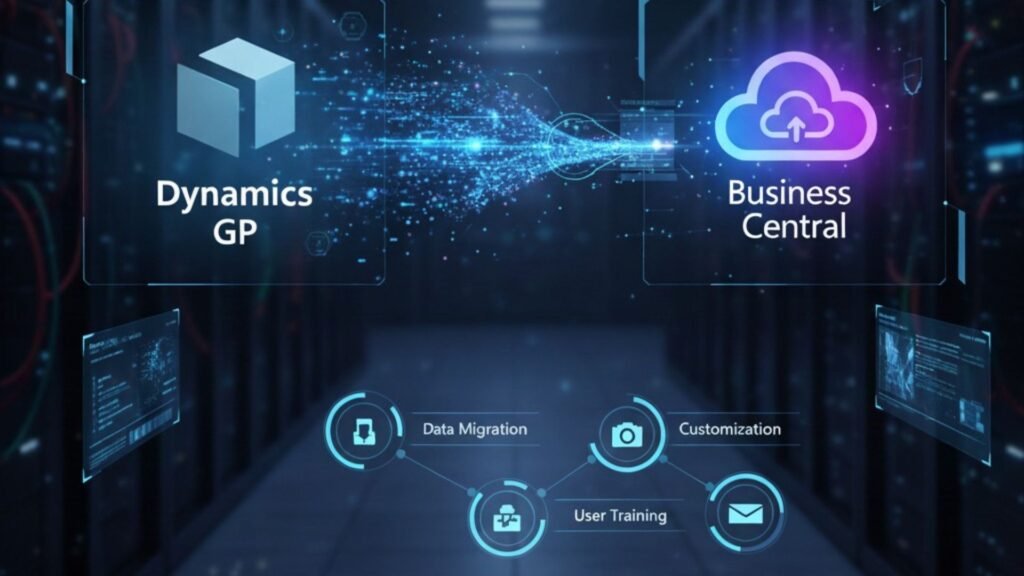Businesses in the UK that have relied on Microsoft Dynamics GP for years are now reaching a critical decision point: whether to continue on an aging platform or move to a modern, cloud-based solution like Microsoft Dynamics 365 Business Central (BC). The latter offers enhanced functionality, real-time insights, automation, and scalability designed for the future of business operations.
If you are planning a GP to Microsoft Dynamics 365 Business Central migration in UK, it’s important to approach it with a clear strategy. Migration is not just about moving data—it’s about modernizing processes, reducing inefficiencies, and preparing your company for long-term growth.
In this article, we’ll break down a practical 5-step roadmap for a GP to BC upgrade in UK, highlight key considerations, and explain why working with an experienced Microsoft Dynamics partner in UK is the safest way to ensure success.
Why Move from GP to Business Central?
Before diving into the roadmap, let’s understand why businesses are migrating:
- End of mainstream support for Dynamics GP: Microsoft is gradually shifting its focus toward cloud-first ERP solutions like Business Central.
- Better integration: BC integrates seamlessly with Microsoft 365, Power BI, Power Apps, and other tools.
- Cost efficiency: Cloud-based systems reduce infrastructure costs and offer flexible licensing.
- Scalability: Business Central grows with your organization and supports multi-entity, multi-currency, and global operations.
- AI & Automation: Business Central uses AI-driven insights and workflows to improve decision-making.
With these advantages, the question is not if, but when you should plan your Microsoft Dynamics GP Upgrade to BC in UK.
The 5-Step Roadmap to Migrate Dynamics GP to Business Central
Step 1: Assess Your Current GP Environment
The first step is to take stock of your existing Dynamics GP system:
- Modules in use: Finance, Inventory, Sales, HR, Manufacturing, etc.
- Customizations: Identify scripts, third-party add-ons, and workflows.
- Data quality: Check for duplicate, outdated, or incomplete records.
- Integrations: List external apps, such as payroll or CRM systems.
A comprehensive system audit will highlight which elements are worth carrying forward and which can be retired.
Pro Tip: Engage Dynamics 365 consultant services in UK to perform a gap analysis. They’ll evaluate your processes against Business Central’s out-of-the-box features, ensuring you don’t carry unnecessary complexity into the new system.
Step 2: Define Your Migration Strategy
Once you understand your current GP environment, the next step is to define your migration approach. There are generally two paths:
- Lift and Shift (Data-focused migration)
- Moves historical and transactional data from GP into BC.
- Best for businesses that want a fast transition without reengineering processes.
- Re-Implementation (Process-focused migration)
- Rebuilds your system on BC, leveraging modern best practices.
- Ideal if your GP system has heavy customizations or inefficiencies.
Choosing between these strategies depends on your business goals, data volume, and level of customization.
👉 Here, a Microsoft Dynamics partner in UK can advise on whether a simple migration or a full re-implementation will deliver better long-term value.
Step 3: Data Migration & Cleansing
Data is the heart of any ERP system. A smooth GP to BC upgrade in UK depends on:
- Data mapping: Identify how GP tables align with BC structures.
- Data cleansing: Remove duplicates, correct errors, and standardize formats.
- Master data preparation: Ensure customers, vendors, items, and financial accounts are accurate.
- Data migration tools: Microsoft provides migration utilities like the Data Migration Framework, which can be tailored by your Dynamics 365 consultant services in UK.
Only migrate what you truly need—carrying unnecessary or low-quality data will complicate your new system.
Step 4: Testing, Training, and Change Management
Even the most technically sound migration can fail without proper user adoption. This step includes:
- Testing
- Validate data accuracy in BC.
- Test workflows (e.g., purchase orders, sales invoices).
- Ensure integrations work with external applications.
- Training
- Provide hands-on sessions for employees.
- Focus on role-based training—finance users, operations managers, warehouse teams, etc.
- Change management
- Communicate why the migration is happening.
- Share timelines, expectations, and benefits.
Microsoft Dynamics 365 support services in UK can help run training programs, provide documentation, and ensure smooth adoption across your teams.
Step 5: Go-Live and Post-Migration Support
Once testing is complete and your users are trained, it’s time to go live. But the process doesn’t end there:
- Hypercare phase: Offer additional support during the first 4–6 weeks after go-live.
- Performance monitoring: Track system performance and user issues.
- Continuous improvements: Business Central is updated frequently by Microsoft, so work with your partner to take advantage of new features.
Post-migration, the role of a Microsoft Dynamics partner in UK becomes crucial—they provide ongoing support, optimization, and advice as your business evolves.
Key Benefits of Migrating from GP to Business Central
- Modern user experience: A web-based, mobile-friendly interface.
- Cloud scalability: Pay only for what you use, scale as needed.
- AI-driven insights: Predict cash flow, forecast demand, and automate tasks.
- Regulatory compliance: Stay aligned with UK financial regulations and data security requirements.
- Seamless integration: Connects with Microsoft 365, Teams, Power Platform, and more.
Role of a Microsoft Dynamics Partner in UK
A successful migration requires more than technical execution—it needs strategic alignment with your business. That’s where a Microsoft Dynamics partner in UK adds value:
- Pre-migration assessment
- Data migration planning and execution
- Process optimization with Business Central features
- Custom development if needed
- Ongoing Microsoft Dynamics 365 support services in UK
By partnering with experts, businesses reduce risks, speed up implementation, and ensure the new ERP delivers maximum ROI.
FAQs About GP to BC Upgrade in UK
Q1. How long does a GP to Business Central migration take?
Ans: A typical migration can take 3–6 months depending on data volume, customizations, and complexity.
Q2. Do I need to migrate all my historical data?
Ans: No. Most businesses migrate only recent financial and operational data while archiving older records separately.
Q3. Will my customizations in GP transfer to Business Central?
Ans: Not always. Some may be replaced by BC’s standard features, while others may require re-implementation through extensions.
Q4. What is the cost of a GP to BC upgrade in UK?
Ans: Costs vary based on business size, data complexity, licensing, and partner services. Working with Dynamics 365 consultant services in UK will help estimate total costs.
Q5. Can I continue using GP instead of migrating?
Ans: Yes, but Microsoft’s focus is shifting toward cloud ERP. Future updates and support will be limited, making Microsoft Dynamics GP Upgrade to BC in UK the smarter choice.
Conclusion
Migrating from GP to Business Central is not just a technical upgrade—it’s a strategic move toward digital transformation. By following the 5-step roadmap—assessment, strategy, data migration, training, and go-live—you can ensure a smooth transition.
With the right Microsoft Dynamics partner in UK, supported by strong Microsoft Dynamics 365 support services in UK, businesses can maximize the value of their ERP investment, eliminate inefficiencies, and prepare for the future with confidence.
If you’re considering a GP to Microsoft Dynamics 365 Business Central migration in UK, now is the perfect time to take the leap and modernize your business.



